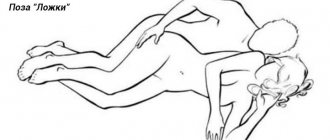Why you shouldn't raise your hands during pregnancy
Expectant mothers sometimes hear about such a ban from older women.
They explain why you should not raise your arms up during pregnancy because this can cause the baby to become entangled in the umbilical cord, which will cause him to suffocate in the womb or during childbirth. You should not believe this, since the relationship between raising your arms when carrying a child and entwining the umbilical cord has not been proven. The danger of such consequences is due to the length of the umbilical cord, the quality of the ultrasound before birth and the qualifications of the doctor involved in the delivery. There are real complications though.
A sharp upward movement of your hands during the second half of pregnancy is fraught with:
- We'll miscarry. The increased load in which the abdominal muscles are involved when holding the arms above the head for a long time or with a sharp upward movement can lead to the rupture of amniotic fluid and childbirth before the due time.
- Detachment of the placenta. Such consequences are possible against the background of placenta previa in a pregnant woman.
- Fetal hypoxia. Staying in this position leads to poor blood circulation in the uterus. As a result, the fetus at this time receives an insufficient amount of oxygen and nutrition. A prolonged lack of oxygen can lead to retardation in intrauterine development, mental and mental disorders in the baby after birth.
- Dizziness or fainting. Since in this position there is a decrease in blood flow to the brain, if a pregnant woman stands for a long time with her arms raised above her head, she may become dizzy, which may cause the woman to fall, which is fraught with consequences.
- Change in the presentation of the baby in the uterus before birth. When raising your arms above your head, the free space in the uterus increases, so the baby is able to change position, which will make childbirth difficult.
This is why you should not raise your arms up during pregnancy, according to gynecologists, especially in the second half of the term. This action is also prohibited during the entire period of pregnancy in cases where a threat of miscarriage or possible premature birth has been diagnosed.
Pregnant women should be especially careful on days when they previously had their periods.
When are expectant mothers allowed to raise their hands?
A ban on such actions for women in this position is not unnecessary. But this does not mean that raising your arms above your head is completely prohibited. It is dangerous to suddenly raise your arms up and hold them in this position for a long time, but raising them briefly, for example, to warm up, will not cause any harm.
Is it possible to stretch while lying in bed?
As mentioned earlier, stretching in itself does not pose a threat to the baby in the womb.
But it is necessary to take into account the duration of pregnancy and the characteristics of its course in order to have 100% confidence in the safety of stretching in bed. In essence, stretching is a muscle warm-up that the body needs to restore blood movement in the vessels. Intense stretching with an incorrect position of the placenta or hypertonicity can lead to a sad outcome: miscarriage or premature birth. Even a couple of seconds of strong muscle stretching stimulates all internal organs, including the uterus. In a situation where pregnancy is not proceeding unfavorably, such stimulation will lead to disastrous consequences.
In recent weeks, gynecologists do not recommend holding your arms above your head for a long time, getting out of bed quickly, or making sudden movements in order to avoid excessive muscle tone.
If the pregnancy, in general, is proceeding well, then there is no reason to be afraid of raising your arms up when doing gymnastic exercises or doing housework. But it should be taken into account that this kind of movement should not be sudden, only smooth and short-term. Otherwise, the consequences may be sad for your unborn baby.
Is it possible to raise your arms during pregnancy?
Gymnastics experts and doctors agree that it is still possible to raise your arms, but this must be done carefully, slowly, gradually and not for long. If you have no complications and no threat of miscarriage, you can slowly hang up your laundry, but you need to do this intermittently
If you feel weak or dizzy, immediately abandon the idea and ask someone close to you to help you. Under no circumstances should you engage in such complex work as washing windows, removing curtains or hanging wallpaper. These are quite energy-intensive activities and can be dangerous for the pregnant body.
But you shouldn’t completely give up physical activity, especially if you led an active lifestyle before pregnancy. Yoga is very useful for pregnant women - all exercises are based on balance and balance. Many poses are available for pregnant women; they develop elasticity and stretchability of the muscles of the back and perineum, which will be very useful during childbirth. An excellent physical activity is swimming. In water, a pregnant woman does not experience such a strong load on the spine; the water seems to support a heavy belly. Moreover, water calms and pacifies. However, choose places with clean water, and be sure to use tampons to protect the vaginal cavity from chlorinated water. Another way to warm up for a pregnant woman is walking. It is available to every expectant mother. You need to walk a lot, often, regularly. It is better to combine walking with walks in forested areas and near water bodies. A sufficient amount of oxygen in a woman’s body is the prevention of hypoxia in the baby.
Pregnancy is a time when a woman should take care of her body, because a new life is developing and growing inside. And if earlier you could neglect your own health, now you need to protect it like the apple of your eye. After all, it depends on him how the baby will be born - strong or weak, sick or healthy. Take care of yourself, don't raise your hands above your shoulders!
how to find out the gender of a child by folk signs
What pregnant women can’t eat, and what they can and should eat
Regarding the consumption of certain types of products, the approach is purely individual, since it depends on whether the pregnant woman is allergic to anything; in any case, it is better to consult a doctor and try allergenic products in small quantities to begin with. Lingonberries are very useful during pregnancy. It contains a huge amount of vitamins, and what’s most convenient is that you can buy it frozen all year round.
I had a problem with the fact that I couldn’t take fish oil for my hair until the end of pregnancy, but then it turned out that I didn’t need it at all. Either from vitamins, or from changes in hormonal levels, the hair became shiny and thick
In what cases are restrictions introduced?
Various restrictions are introduced if there are any violations in the woman’s health or the course of pregnancy itself. Although no one has proven a clear connection between lifting limbs and harm to the baby, in contrast, for example, doctors still advise caution in such cases:
with hypertonicity of the uterus, when any physical activity can provoke agitation and spasm; if there is a threat of premature rupture of amniotic fluid; in the last weeks before birth, when the baby has already taken the correct position in the uterus, sudden movements of the mother increase the risk of reverse reversal; Caution is also necessary with such pathologies as placenta previa.
Gymnastics instructors for pregnant women believe that if a woman condemns herself to inactivity throughout her entire pregnancy, is afraid of habitual activity, and tries to spend most of her time lying down, then for her even simply raising her arms up will become a serious burden.
The habits and lifestyle of the expectant mother, of course, must change compared to what they were before the child was conceived. However, doctors never tire of reminding that pregnancy is not a disease, but a normal physiological state of the female body. Therefore, most restrictions relate to excesses or bad habits:
- You cannot sunbathe for more than 20 minutes. And these 20 minutes should not be spent under the direct rays of bright sun;
- High heels are not recommended;
- It’s worth holding off on visiting the bathhouse or sauna for now;
- you cannot lift weights exceeding 3-4 kg, and these kilograms cannot be lifted sharply or from the wrong position;
- you need to watch, avoiding overeating.
Doctors today are loyal even in such matters as allowing a woman to cheer up with a natural drink, albeit in limited quantities.
Is it true that pregnant women should not take a bath?
Another, no less important issue is taking a bath during pregnancy. If you want to “swim”, observe moderation. Your bath time should be no more than 10 minutes at a water temperature of 34-37 degrees. But, under no circumstances should you steam or take hot baths, or steam your feet. Such treatment procedures are contraindicated for pregnant women and can cause miscarriage or premature birth. Visit the pool and water aerobics (until the plug comes out) - this has a beneficial effect on the mother’s body.
Why is it undesirable?
Most expectant mothers wonder whether it is possible to raise their arms up, because many people like to stretch well in the morning or stretch their arms up when their back hurts. During pregnancy, it is believed that you should not raise your arms up. Is it really? And why?
Many people tell young mothers that they shouldn’t take risks and therefore it’s better to moderate their ardor and lead a quieter life until the baby is born. After all, the longer the period, the larger the belly, and this creates certain inconveniences (especially if you need to sweep/wash the floor). In addition, the girl becomes more clumsy and clumsy.
Better yet, from the very beginning of pregnancy, make sure that all movements are smooth, unhurried and calm. After all, any sudden movements can cause discomfort in the child. Sometimes they can even provoke premature birth.
How does this relate to the ban on raising hands? The bottom line is that most qualified specialists are unanimous in the opinion that raising your hands for a long time or suddenly is impossible.
What could be the consequences of a girl holding her hands above her head for a long time during pregnancy?
- With a prolonged vertical position of the arms, the size of the space in the abdomen changes, which is why the baby begins to move and tends to change his position (for example, upside down). Also, the constant movement of the baby contributes to the entanglement of the umbilical cord.
- If you suddenly raise your arms above your head, your abs tense. At this time, pressure occurs on the child, which is extremely undesirable (especially at the end of the 2nd trimester and in the third).
- Raising your arms up is usually necessary when working, and stress and overwork are not recommended for a pregnant woman.
There are mothers who can run throughout their pregnancy, work, and do everything around the house. But doctors allow this only if the pregnant woman feels well.
How does it affect a woman?
When the arms are raised for a long time, the pregnant woman begins to feel discomfort and unpleasant sensations in the lower abdomen. This is due to severe muscle tension. In addition, it is noted:
- Dizziness.
- Cloudiness occurs in the eyes.
- A pregnant woman may lose her sense of balance. Because of this, a woman can fall even from her own height, which is very undesirable for a child.
It is extremely dangerous if no one is nearby at the moment of dizziness and malaise. Therefore, many experts recommend a calm lifestyle without physical or nervous stress, so that the risk of losing a child is minimal.
Quite often, pregnant girls feel unwell while hanging out laundry or while washing windows.
How does it affect the fetus?
It should be noted that you should not make any sudden movements during pregnancy. If you suddenly and sharply raise your arms up, then due to sudden and strong tension you can provoke premature birth. You should be especially careful in the last months of pregnancy.
In the later stages, it is recommended to raise your arms up for a long time in post-term pregnancy so that contractions begin.
The most dangerous side of raising hands is oxygen starvation in a child (hypoxia). If you raise your arms up too often, or hold them in this position for a long time, the blood flow to the uterus is disrupted, which leads to hypoxia or oxygen starvation. Ultimately, various types of deviations appear:
- Deviations in the psyche and mental development.
- Slow growth and development of the fetus.
- Problems with the baby's postpartum adaptation.
- The possibility of miscarriage increases.
If you do not want to harm your baby, try to raise your hands up as little as possible. In the later stages, it is better to avoid this altogether.
There is an opinion that you should not raise your arms up during pregnancy, as the baby may become entangled in the umbilical cord. This sign of past years frightened expectant mothers, because it was fraught with troubles during childbirth, or even lead to fetal suffocation.
This statement has now been completely dispelled, since it is not substantiated by anything, and scientists have not identified a connection between raising hands and the fact that the baby is entwined with the umbilical cord. Why? The fact is that the size of the umbilical cord is determined genetically, and if entanglement with the umbilical cord occurs, it will be for a completely different reason.
The baby moves often in the womb, and if the umbilical cord is very long, then there is a chance that he will get entangled in it. The risk increases if the baby is active on his own. And it is almost impossible to predict or prevent this in any way.
they say you can't stretch
my friend at 7 months old re-glued the wallpaper at home (you have to stretch there too) and nothing, and another friend carried herself like a vase in her arms for 9 months, did nothing - but she had entanglement.
During my first pregnancy, I was running around like an electric broom, I went to the birth from work - everything was fine. Now I don’t carry around anymore (I’m lazy), but I stretch, it’s as if the ultrasound said there is no entanglement. (we are already 37 weeks)
But the risk of entanglement may increase due to stress and anxiety: the motor activity of a baby, nervous because of the mother’s stupid superstitions, increases significantly and under certain conditions (short term, small fetus, abnormally long umbilical cord) entanglement may occur. So don’t be nervous and stretch if you want and there is no discomfort in the tummy (pain due to stretching of the abdominal muscles)
When is it allowed?
Many gynecologists are unanimous in the opinion that physical exercises can be performed, but only in cases where the pregnant woman feels great. You can even do yoga or gymnastics, but your hand movements should be smooth and calm. But if there are problems with the attachment of the placenta to the uterus, then you should not raise your hands.
A leisurely walk, light housework that does not require special strength, will not harm the baby’s health and well-being, but, on the contrary, will have a positive impact on his development.
The most accurate period at which you can still raise your arms was determined by modern medical experts after conducting a study with a group of pregnant women. Based on these data, it was assumed that you can raise your arms in the 1st trimester of pregnancy, but not in the 2nd and 3rd trimester.
One way or another, the main thing is a positive attitude towards the birth of a child. There should be less worry and negative emotions. But still, you should not stand for a long time with your arms raised up or raise them too sharply and quickly. And in general, pregnant women are prohibited from making any sudden movements, not just suddenly raising their arms up.
Useful video about physical activity during pregnancy
Is raising your arms up during pregnancy dangerous? — revealing secrets about pregnancy on Pitanie4Zdravie.ru
Pregnancy makes a woman truly beautiful. But during pregnancy, many questions arise that need to be answered. Especially for you, in the “Pregnancy from A to Z” section, we publish interesting and useful articles about pregnancy, so that this wonderful time for you will be as “problem-free” and joyful as possible.
You can also find here the main signs of pregnancy, how the baby’s fetus develops at different stages of pregnancy, understand what is possible and what is not possible at different stages of pregnancy. Learn more about the effect of various foods, vitamins (for example, the effect of folic acid) on pregnancy.
Umbilical cord entanglement: myth or truth?
The most common information is that such physical activity is prohibited, since the umbilical cord can wrap around the baby’s neck, and he will either die in the womb or suffocate at birth.
However, most doctors argue that these fears are unfounded. It is also possible for expectant mothers who are not keen on physical exercise or do housework to entangle the baby's umbilical cord.
In what cases can the fetus become entangled in the umbilical cord?
This situation occurs when the following factors are present:
- Polyhydramnios. In this case, the baby has more opportunity to move in the mother's tummy and the umbilical cord may become entangled.
- Extended umbilical cord. This is genetically determined. The longer the umbilical cord, the more often pathology occurs.
- Lack of oxygen in the fetus. If a child experiences hypoxia in the womb, he begins to actively move.
- Mother's stress. In a woman who is constantly experiencing stress, the level of adrenaline in the blood increases, which is why the fetus becomes more active and mobile.
As you can see, raising your hands during pregnancy is not included in the list of risk factors, so in most cases doctors do not associate it with the possible entanglement of the baby in the umbilical cord and a threat to his health and life.
Why did this statement arise?
There is even an explanation for the reason for this myth. Just a few decades ago, our grandmothers were forced to do physical work during pregnancy, for example, carrying water from a well, washing clothes on the river and then carrying it back, lifting weights while working in the garden or in production.
A pelvis with heavy sheets or clothes is a serious burden during pregnancy, so all sorts of complications often occurred during childbirth.
Evidence for this argument
However, some experts, including gynecologist A.G. Nikitina, warn that in the first half of pregnancy, expectant mothers:
- It is undesirable to raise your hands up,
- stays for a long time with his hands raised,
- throw them sharply up above your head.
In this position, a number of blood vessels in the pregnant woman are pinched and less oxygen reaches the fetus. Therefore, he may experience anxiety and move vigorously, which means that there is a threat that the umbilical cord will wrap itself around the baby.
4th month
Myth: Expectant mothers should not pet cats.
Why: There was a belief that if you stroke a cat, especially a very fluffy one, the child will be born with a “hairy spot” on the body or the child will have many enemies in the future.
Expert opinion: In fact, cats can become a source of toxoplasmosis, a disease that has a very adverse effect on the development of the unborn child. If you do not know the animal and are not sure about it, then it is better to avoid contact. You should take your own pet to the veterinarian to undergo all the necessary tests and make sure that it is not sick and is completely safe for you.
Why You Shouldn't Raise Your Hands During Pregnancy
During pregnancy, women become the most sensitive and emotionally unprotected. Even psychologically strong women during pregnancy begin to believe in numerous signs and become interested in questions that would never have occurred to them in their usual way of life. This is all due to the hormonal changes that occur while expecting a child.
One of these signs of pregnant women is the question that constantly torments many expectant mothers, why pregnant women should not raise their hands. By asking themselves or their friends such a question, pregnant women themselves find the answer that by raising their hands, they can provoke the umbilical cord to wrap around the baby’s head, which can be a significant complication during the birth process.
Gynecologists constantly reassure pregnant women that this stupid statement is unfounded. But there will certainly be some emotionally unstable pregnant woman who doubts the qualified answers of specialists. She will definitely exhaust herself, sow seeds of doubt in the souls of other pregnant women, and subject them to significant unfounded worries.
An extremely accurate answer to the statement why pregnant women should not raise their hands was given by modern scientists studying this issue. During the second trimester, it is undesirable to stay with your hands raised for a long time. Prolonged raising of hands may result in fetal hypoxia. Being in such an uncomfortable position, the child does not receive enough oxygen necessary for proper breathing.
Oxygen starvation not only of the unborn child, but also of a pregnant woman may well cause the expectant mother to faint. That is why, in case of fainting, it is imperative to bring the woman to her senses and restore normal breathing. Quite often, fainting during pregnancy occurs when falling, which is most dangerous due to the possibility of provoking the rupture of amniotic fluid, which will lead to premature birth.
Raising the question of why pregnant women should not raise their hands, it should be noted that the argument about the possibility of the umbilical cord entwining itself around the child is completely unfounded. During the process of bearing a child, it is not at all impossible that after the thirtieth week of gestation the baby becomes entangled in the umbilical cord. This phenomenon is quite common in practice; it does not depend at all on the position of the pregnant woman’s hands, but on the length of the umbilical cord and the activity of the fetus’ behavior in the womb.
During a woman's pregnancy, when the length of the umbilical cord develops significantly above the existing average size, as well as when the child is excessively active, it is impossible to avoid some entanglement with the umbilical cord. Even if such entanglement has occurred, there is absolutely no sufficient reason to assume that this situation will remain absolutely unchanged almost until the birth itself. A child in the mother's womb is constantly moving. As a rule, everything returns to its place, regardless of the baby’s activity or the length of the umbilical cord. Therefore, the answer to the question of why you can’t raise your hands during pregnancy remains inappropriate, having come to our days from the time of the birth of our great-great-grandmothers.
Gynecologists notice that standing with your arms raised for several hours is a direct way to seriously harm your unborn baby. It should be noted that not only pregnant women, but even physically strong men are not capable of such physical exercises.
During pregnancy, a woman is not at all forbidden to hang out her washed clothes for a short time, holding her hands in a slightly raised position. This is a simple, natural, positive load, which under no circumstances should cause severe fatigue.
Therefore, it is completely inappropriate to fill the expectant mother’s head with stupid questions about why she can’t raise her hands during pregnancy. Think about a bright, joyful future event, prepare for it, listen to good music, find various reasons for joy. Remember that thought is material, a wonderful life awaits you ahead!
Is it possible for pregnant women to raise their arms up?
Do you want to know the answer: Is it possible for pregnant women to raise their arms up? In this article you will learn everything that interests you on this topic.
Why pregnant women should not raise their hands up
There is nothing supernatural or extremely surprising in the familiar concept that a large number of expectant mothers carefully and, of course, reverently treat all the norms and principles, which, as usual, all doctors strongly recommend that they observe. And this is not surprising, since all parents really want, so that their baby is born, undoubtedly, a healthy baby, and delights them all his life.
All over the globe, they have managed to come up with a large number of signs that today expectant mothers so cleverly use and very often blindly follow them. But these same signs sometimes tell us with one voice that it is impossible to perform some basic and extremely simple actions.
One of the most tempting and exclusive reasons about pregnancy is the question “why shouldn’t pregnant women raise their hands?” Our ancestors argued that frequent raising of hands at a level above the head can lead to the baby simply being wrapped around the umbilical cord, but such a phenomenon can be fraught with numerous unpleasant incidents during labor, which immediately strikes a fierce fear in poor mothers.
Well, here you can calm down and breathe a sigh of relief, because the fact is that in fact, medical scientists have long found out that there is no connection between raising your arms vertically up and wrapping the umbilical cord around the baby.
An extremely accurate and practical answer to the question of why pregnant women should not raise their hands was given by modern scientific doctors who conducted research in the field of gynecology on a group of pregnant women.
During this study, it was revealed that from approximately the second trimester of pregnancy, expectant mothers should not raise their arms up, much less keep them in a raised position for a longer period.
The whole point is that an elevated posture of the arms can cause hypoxia in a tiny baby, and in the presence of hypoxia, an extremely small amount of oxygen will flow to the child. In addition, this oxygen deprivation can provoke fainting in the expectant mother, but of course, everyone knows what such falls (and especially from a height) mean for mother and baby. Moreover, a similar body position can provoke rupture of amniotic fluid, which will lead to premature birth.
During pregnancy, it is not at all excluded that the baby may become entangled in the umbilical cord after thirty weeks of pregnancy, but this phenomenon is quite common, and it does not depend on the environment and the actions of the mother, but on the length of the umbilical cord and the activity of the fetus in the womb. If, during the development of pregnancy, a woman’s umbilical cord grows above average in size, and there is excessive activity of the baby, then entanglement in the umbilical cord is practically possible.
But even if entanglement has occurred, this does not mean that everything will remain the same until birth, because babies often twist and everything returns to its place. And since the length of the umbilical cord is a purely genetic factor, which the expectant mother cannot influence.
Hypoxia can only be caused by raising the arms and the mother remaining motionless for a long time, but there is another outcome of these movements.
In the process of hanging out laundry or exercising, a woman is subjected to a dynamic load, which, in the absence of health problems for the expectant mother and the immediate course of pregnancy (such as the threat of miscarriage, abnormal placenta previa, or abnormal position of the fetus), is absolutely permissible.
The expectant mother can easily afford to perform a whole range of exercises aimed at stimulating a healthy pregnancy.
Light housework can also be a positive load for a mother, but in this case the main thing is to know when to stop, since it should be remembered that any load during pregnancy should in no case cause excessive fatigue.
Source of the article: Is it possible for pregnant women to raise their hands up website https://mamapluspapa.ru
Basic rules for pregnant women
Why do you feel the urge to stretch after waking up? The fact is that the body needs some time to enter the “working mode”. By stretching, we warm up stiff muscles and prepare them for active work.
However, when asked whether it is possible to do pull-ups during pregnancy after sleep, doctors answer in the negative. This is due to the fact that during stretching, the abdominal muscles tense and can cause tension in the uterus. And this risks causing premature birth in the third trimester of pregnancy.
Instead of stretching, you should lightly massage your stiff limbs, and also gently stretch your neck, tilting your head alternately to the left and then to the right shoulder. After the woman gets out of bed, she can walk in place, raising her knees slightly, and stretch the joints of her arms and legs.
All exercises should be performed without straining, with the muscles of the torso extremely relaxed.
Why is it still undesirable to raise your hands up?
In addition to the threat of entanglement, there are other reasons why it is undesirable to raise your arms during pregnancy:
Fetal hypoxia
It is a proven fact that a woman who stands for a long time with her arms raised up has impaired blood circulation in the uterus. Because of this, the unborn child receives less oxygen, and this is a threat to his development and even life.
A pregnant woman may have a miscarriage, or the fetus will develop much more slowly than it should. Problems may also arise after childbirth: the child will not adapt well to his new environment, and later he may develop mental or intellectual disabilities.
Hypertonicity of the uterus
For women who have problems with uterine tone, any physical activity is dangerous. It can lead to hypertonicity, and later to shortening of the cervix, which can cause premature birth.
Rupture of amniotic sac
If, during a long period of pregnancy, the expectant mother suddenly raises her hands up, there is a risk of rupture of the amniotic sac (which will lead to premature labor). If this does not happen in the later stages, then if the amniotic fluid completely ruptures, the woman may lose the child.
However, such cases are not recorded too often, and the main cause of the pathology is not sudden movements, but an infection that has penetrated the uterus.
The child will change position
The correct position of the baby in the uterus is head down; this position of the fetus is optimal for future births. But if the baby becomes uncomfortable (due to the mother's raised arms), he may roll over.
Risk of injury
Reaching upward during pregnancy is also dangerous due to a banal loss of balance and the risk of injury. For example, if a woman decides to hang curtains herself, hang out laundry or a heavy and wet blanket: one wrong move and she may fall.
At what time is it not recommended to do pull-ups?
The danger of pull-ups directly depends on the stage of pregnancy:
- Until 15 weeks. During this period, almost any physical exercise is completely safe for both the mother’s body and the fetal egg.
- From 15 to 32 weeks. The current period of time is the most dangerous. Any careless movement or inadequate loads can cause pregnancy complications.
- From 32 weeks until birth. Raising your arms above your head or doing pull-ups at this stage can provoke an increase in uterine tone and premature onset of labor.
Important! All movements of the mother, especially in the later stages, should be as smooth and restrained as possible. This creates a calm environment, which is extremely important for a growing child.
What is possible
If you can’t suddenly stretch upward or stand in this position for a long time, then what kind of activity is allowed for pregnant women? In order to give birth to a child normally, the mother’s body must be resilient and tolerate physical activity well. Special exercises, aqua gymnastics and other types of physical education for pregnant women will help in preparing for childbirth.
And you can do a light workout at home. It includes: walking in place, half-squats, smooth bends to the right and left, with arms sliding along the body. Discuss with your doctor the physical activity that is acceptable in your particular case, and systematically train your body.
Breathing exercises are also allowed: chest and abdominal breathing, shallow, quick inhalations and exhalations. The ability to control breathing and breathe correctly helps supply the fetus with oxygen during pregnancy and childbirth.
If doctors even allow gymnastics for pregnant women, then there is no need to give up housework and walks. A woman can cook food, wash dishes, sew, do laundry, and lift light objects. That is, when asked whether pregnant women can raise their arms up, doctors firmly answer that it is possible. The main thing is that the woman does not strain herself too much and feels good.
There are a lot of myths around pregnancy. Watch a video in which an obstetrician-gynecologist talks about the most common misconceptions.
Although pregnancy is not a disease, any physical activity should be moderate.
Sudden movements and moving heavy objects should be avoided, but otherwise you should follow the advice of your doctor and common sense. What do you think?
While expecting a child, women are advised to take care of themselves and limit physical activity and stress. There is also an opinion that raising hands up for expectant mothers is extremely undesirable. Is it really dangerous? Let's look at the facts and myths regarding why pregnant women should not raise their hands up.
A list of possible complications and the conditions under which they arise will help you understand whether such loads are acceptable in your situation. Even expectant mothers who play sports should take the new situation and the restrictions it imposes into account.
Pregnant women sometimes hear this prohibition from their mothers and grandmothers. The older generation explains it by the fact that if the expectant mother raises her hands, the child can become entangled in the umbilical cord and suffocate in utero or during childbirth.
You should not take this information to heart. From a scientific point of view, the connection between these events is not substantiated. The likelihood of such complications depends on the length of the umbilical cord, which is a hereditary feature, the quality of prenatal ultrasound diagnostics and the qualifications of the obstetrician delivering the baby. But there are also very real negative consequences.
If a pregnant woman in the later stages (starting from the 2nd trimester) suddenly raises her hands, complications are possible, namely:
- Abortion
.
Excessive loads placed on the abs during prolonged holding of the arms above the head or their sudden raising can provoke rupture of amniotic fluid and premature birth. - Placental abruption
.
There is a risk of this outcome if a woman has placenta previa. - Fetal hypoxia
.
In a standing position with raised arms, the blood supply to the uterus deteriorates. Accordingly, the child at this moment does not receive enough oxygen and nutrients. Long-term consequences include intrauterine growth retardation, mental and mental disorders after birth. - Dizziness or fainting
.
Since raising your arms reduces blood flow to the brain, staying in this position for a long time can cause the listed symptoms and can result in a fall, which is very dangerous for a pregnant woman. - Changes in the position of the fetus in the uterus in the later stages
.
Since when a pregnant woman raises her arms, there is more space in the uterus, a baby in a cephalic presentation may roll over. Incorrect fetal position on the eve of pregnancy can complicate the birth process.
Considering the possible consequences, gynecologists do not recommend expectant mothers to raise their hands up in the later stages. The restriction applies to sudden movements and prolonged stay in this position (hanging curtains, wallpapering, painting walls, etc.). Even if you are in good physical shape, it is better to delegate these household activities to relatives.
Also, you should not raise your hands up at any stage when diagnosing a threat of miscarriage or premature birth.
A woman needs to be especially careful on those days when she previously menstruated.
Why can't pregnant women stretch?
When a pregnant woman begins to stretch upward, a number of changes are observed in the body, in particular:
- The tone of the muscles of the trunk and lower extremities increases.
- The contractile activity of the uterus increases.
- The rate of transport of oxygen and nutrients in the mother-placenta-fetus system decreases.
- The metabolism as a whole is activated.
- Blood pressure increases due to the systolic component.
The unborn child begins to experience significant stress, which is fraught with many complications.
Is it harmful for pregnant women to raise their hands?
Many doctors strongly recommend that women continue to exercise during pregnancy, undoubtedly within reason, so as not to harm the baby’s health. Sports clubs offer special programs for expectant mothers that allow them to stay in shape even during the entire nine months of bearing a child.
Of course, there are situations when pregnancy is quite tiring, causing nausea, attacks of fatigue and drowsiness. In this case, before starting training, you need to consult a gynecologist.
Why do doctors so strongly recommend not to forget about physical activity during pregnancy? It's all about the upcoming birth.
Moreover, wise nature did everything possible so that for nine months the woman did not exhaust herself with active physical exercises in the gym, but only slightly maintained the necessary physical shape.
This is explained by the fact that during pregnancy the activity of the endocrine system changes dramatically, as a result of which the endurance and elasticity of muscles and tendons significantly increases. Nature naturally made sure that childbirth was as easy as possible. However, you can help both yourself and nature increase your body's stamina.









